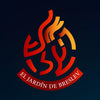
Parasha Sheláj Far (Bamidbar - Lev 13, 1–15, 41)
“Send men for you so that explore the land of Canaan” (Bamidbar 13:2)
The spies committed a terrible sin by speaking ill of the Promised Land. The great commentator Rashi asks why the Parashah that speaks of the spies was related to the parashah that speaks of Miriam, and answers that it is because she had been punished for the slander she said about her brother, and these wicked people saw the punishment she received, but still did not assimilate the lesson.
The Israelites also believed what the spies said and they too wept. As the
verse (Bamidbar 14:1): “The whole assembly lifted up and uttered his voice, and the people wept that night”,
For this, the people of Israel were severely punished. The Gemara says: (Taanit 29a): “Raba said in the name of Rabbi Yochanan that that was the night On the ninth of Av (Tisha b'Av) The Holy One, Blessed be He, said to them: You have cried in vain, now I will establish a crying for generations.” And indeed, to this day, we mourn and lament the destruction of the two Temples.
The verse also says (Ibid. 14:24): “But My servant Caleb, because a different spiritrent was with him and followed Me fully, I I will take him to the Land where he arrived.” What is it about?
What differentiated Caleb's spirit from the rest of the spies and how did he have the merit of reaching that level?
To understand this, we need to go back to the previous parashiot.
Parashat Bamidbar tells us about the census of each tribe in detail. Why were all these details important, and why wasn't a general report of the number of people in the village enough?
Likewise, in the parasha Naso the Torah expands on the account of the offerings of each leader at the time of the inauguration of the Tabernacle, detailing each one separately even though All the offerings were similar. On the other hand, the Torah refers very briefly and even through allusions to the thirty-nine forbidden tasks of Shabbat and other important laws.
From this we understand that the census of the tribes was not simply a survey to
to know the number of Israelites. The Creator knows all the secrets, and He already knew how many there were.
The purpose of counting each tribe separately was to teach that each tribe was important to the Creator.
Each tribe had special qualities they had inherited from their ancestors, and these were not found in other tribes. No person is the same as another, because every Jew has something unique and special that can only be learned from them.
That is why Hashem counted each tribe separately, giving importance to each one in its own right, so that we would understand that each tribe has a special quality from which we must learn.
For example, from the tribe of Judah, which has the kingship, we must learn the manner of conduct of a talmid Chacham (a wise scholar), who is like a king.As it is written (Gitin 62a): “From where do we learn that the Wise Men are called kings? He answered him: Because it is written: They must behaveto be carried out with correctness and good qualities such as c"It corresponds to the sons of kings."
From the tribe of Issachar, who bear the yoke of the Torah, we must learn the importance of effort and dedication to the Torah.
From the tribe of Zebulun who helped support those who studied Torah, We must learn how much we should strive to support Torah scholars and give our money to maintain Torah and chesed institutions.
In the same way we must learn from each tribe its unique quality, in order to be crowned with the elevated qualities of all of them.
That is why the Torah also expanded on the story of the offerings of each leader, because each tribe was unique and singular.
The fundamental thing was that everyone acted out of love for Heaven, to give satisfaction to the Creator and serve Him with all their hearts.
We must learn the good qualities of all tribes!
The level that the tribes reached is only possible when one has the aspirations and will to grow in holiness and purity.
This was what distinguished Caleb ben Yefune, who had a “spirit-
“different ritual”: Since his will was to get closer to the Creator, he tried to learn from the elevated qualities of others.
We must know that we will never achieve our goals if we do not aspire to achieve them. The greater the aspiration, the greater the desire to act toward that goal, and thus the greater the chances of achieving it. This is the only way to grow and elevate in Torah and fear of Heaven:
"Having true aspirations and desires to grow in Torah, yearning to increase a little more in holiness with each moment. Because according to aspiration is the force that drives a person to grow spiritually.
Dedicated to the healing of all the sick in Am Israel and throughout the world, that they may have prompt and complete healing, also dedicated to the success of all those in need and all those dedicated to spreading the message of Emuna.
The Breslev Garden recommends:
